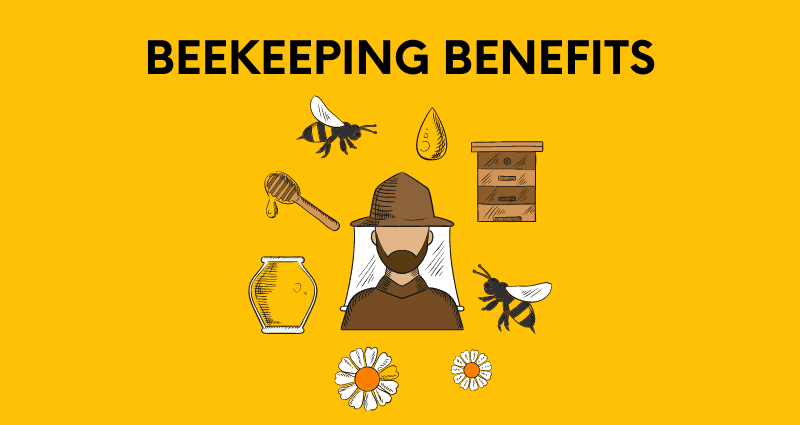The benefits of beekeeping are abundant. We cannot understate how valuable bees are for the environment and economy, but beekeeping provides many other benefits to the world.
Below is a shortlist, but read on to learn more about the broad benefits of beekeeping.
- Bees are a vital element in our environment
- Bees support multiple economies
- Children find inspiration studying bees and beekeeping
- Communities flourish around bees
- Honey has been a staple of our diet for thousands of years
- Honey products support the economy
- The cost of beekeeping is low
- There are tax incentives for beekeepers.
And the best part is…
Beekeeping IS NOT a difficult hobby to get started. Some basic upfront costs and a normal learning curve can be expected. But the community you will find is worth the effort.
Environmental Benefits
Beekeeping has a variety of positive impacts on the environment. The following are some of the most significant benefits.
1. Pollination
Bees are pollinators. What is a pollinator, you may ask? Insects and animals are the primary pollen carriers from one plant, such as wildflowers. Plants reproduce in this way. When a bee feeds on a plant, pollen attaches to the bee’s body. Some pollen enters the second plant’s reproductive system upon landing on it.
Pollination is the scientific term for this process. Plants can only produce new seeds through this process, and that’s how new plants grow. Plantlife would be impossible without bees as pollinators.
2. Beekeeping Provides Predators With Food
There are a variety of species that prey on honeybees for their nectar and pollen. Here are a few examples:
- Insects
- Arachnids
- Birds
- Mammals
Beekeeping positively affects biodiversity since it helps maintain a stable food supply. Predators will have plenty to eat if bee numbers remain healthy. As a result, an apiaries population will help promote order in the food chain.
Economic Benefits
Many high-value crops, such as almonds and broccoli, depend entirely on commercial honey beekeepers’ pollination services. Insect pollination accounts for 9.5% of the global economic value of agricultural products for human consumption.
Researchers estimated in the year 2000 that the value of bee-pollinated crops in the United States alone amounted to $14.6 billion. Also, US bees produce around $150 million worth of fresh honey annually.
So, if there is a reduction in bee populations because of harmful pesticides or any other cause, it can cause lower crop yields and destroy the ecosystem. Also, it can result in higher production costs and ultimately higher pricing for consumers.
Educational Benefits
Honey bees and other pollinators can teach youngsters the need for a healthy food supply. They can also help them develop the skills needed to protect the environment and the honey bee species that are in decline.
This isn’t to say that schools should own bee colonies and keep them on school grounds.
It should be easy to find local beekeepers willing to showcase their hives and knowledge to students of all ages. These students will learn things like;
- the difference between the queen bee, drones, and worker bees.
- the types of beehives and how they work
- how bees make honey
- bee anatomy
- how bees fly and how fast bees can fly
- how to stay safe around bees and prevent bee stings
- the difference between honeycomb, beeswax, royal jelly, pollen, etc…
- the health & nutritional benefits of honey and pollen
- how to articulate the benefits of beekeeping and advocate for our natural world
From naming the bees, taking care of a hive, and learning to harvest and sell the honey, all beekeeping activities can positively affect a child’s development. Through small group beekeeping sessions, students can develop soft skills like teamwork, creativity, hard work, and listening.
You may even consider indoor beekeeping as an option for your children or students showing interest in apiaries.
NOTE: I have personally seen how effective beekeeping can be as an activity for students. I shot the video below while working at a residential education non-profit. Having worked at a non-profit focused on child rehabilitation, beekeeping was an activity that the students loved to participate in. They tended to the hives, helped tap the honey, packaged it, and sold the raw honey to support the non-profit.
Beekeeping For Personal Health
Improves Mental Health and Well-Being
During the Covid-19 pandemic, researchers studied how backyard beekeeping and time spent outdoors improved mental health and well-being. Apiculture has many well-documented advantages. Much therapeutic value to mental health has become clear in a decade highlighted by Covid-19.
Experts have emphasized the importance of sitting quietly many times. A peaceful and contemplative state of mind characterizes many aspects of mindfulness. Using it can be a rewarding experience for people who suffer from depression, PTSD, and anxiety.
Researchers often compare beekeeping to meditation because of its focus on mindfulness and self-reflection. It has been incredibly beneficial to people during Covid-19 time.
So, research proves that the social and community aspects of beekeeping and other outdoor pursuits promote mental well-being by fostering interpersonal connections.
Honey Health Benefits
A wide variety of home remedies and alternative medicine therapies rely on honey. Plus, there is a growing amount of research to support the varying health benefits medical practitioners find through the use of honey. It offers a wide range of potential health benefits.
Here are five distinct health benefits derived from honey:
1. Regulates Blood Sugar Levels
Compared to table sugar, honey provides some benefits for controlling blood sugar levels. Despite honey’s role in raising blood sugar levels, its antioxidants help prevent metabolic syndrome.
It also reduces inflammation in people with type 2 diabetes. Even though honey is better for people with diabetes than refined sugar, you should still use it in moderation.
2. Enhances Cardiac Health
There is some evidence to support that honey can help improve blood fat levels and lower blood pressure. Also, regulate your heartbeat and prevent the death of healthy cells.
Research linked honey consumption to a lower risk of high blood pressure in women in one study that included over 4,500 participants over forty. Bees generate propolis, a resin made from sap-producing trees and other plants, in raw honey. Preliminary research suggests that propolis may help lower cholesterol and triglyceride levels.
3. Heals Wounds and Burns
People used local honey to treat wounds and burns as far back as ancient Egypt. In the modern world, it is still a common practice. A study of 26 trials on honey and wound skin care showed that it was most successful at healing partial-thickness burns and wounds that became infected following surgery.
Researchers found honey to be 43.3% effective in treating wounds in patients with diabetes-related foot ulcers in one study. Also, researchers found topical love to heal 97 percent of participants’ diabetic ulcers.
Researchers believe that honey’s anti-inflammatory and antibacterial properties handle its therapeutic properties. Besides, honey can also treat psoriasis and herpes lesions.
4. Suppress Child Coughing
Children who have upper respiratory infections experience coughing as a symptom. Over-the-counter cough medicines are inefficient and can cause adverse effects. Bee honey may be a viable alternative, as evidence suggests it is a practical therapy choice.
Studies on honey and cough in children show it is more effective in relieving cough symptoms. It also helps shorten the duration of coughs. According to another survey, bee honey can help children and parents who suffer from coughing sleep better at night. Honey also has no adverse side effects, unlike certain cough medications.
5. An Excellent Source of Antioxidants
Flavonoids and phenolic acids are two essential bioactive plant chemicals and antioxidants. You can find them in high-quality honey that is minimally processed, unheated, and fresh. The darker the kind, the more antioxidants it contains.
Reactive oxygen species (ROS) can accumulate in cells and cause harm if antioxidants do not neutralize them. It can lead to premature aging, type 2 diabetes, and heart disease. As a result, honey’s antioxidant concentration handles many of the health benefits it provides.
FUN FACT: The varying types of honey found throughout the world have different health benefits.

